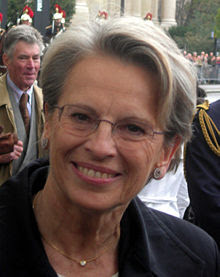July 14, aka Bastille Day, came and went. France's celebratory show of military might made its collective way along "la plus belle avenue du monde", every major flippin' TV channel covered the it - live, and what ho!
The French president François Hollande (once again) broke an election promise (don't gasp in surprise).
Remember how during the presidential election campaign Hollande had said that, if elected, he wouldn't follow the example of his predecessors by conducting interviews at the Elysée palace?
Well....he had changed his mind - obviously.
 |
| François Hollande (screenshot from Huffington Post video on DailyMotion) |
Weekend anchors Claire Chazal (TF1) and Laurent Delahousse (France 2) were the lucky couple invited along to pose questions on:
**shale gas (there won't be any exploration during his presidency apparently),
**taxes (he'll decide next year whether there need to be increases but wants to keep them to a minimum),
**the economy ("It's recovering!" Please don't splutter and snort in contempt as you read that...Hollande actually said it),
**a possible Sarkozy return (Hollande is "cool" about it - that's paraphrasing what he said),
**the Greens (the political party - not the type you might not want to eat) and their place in government, pensions, the Bernard Tapie affair (here's a challenge...try to explain what that's all about Twitter style) and all the usual subjects you might expect to be of interest to viewers.
It was a veritable flood of questions and follow-ups from both Delahousse and Chazal as the two battled for Hollande's attention during 35 minutes and Hollande, the poor guy, resembled a spectator at a tennis match with his head swinging from side to side, seemingly unsure as to whom he should direct his replies.
Chazal et Delahousse font" tourner la tête" de... par LeHuffPost
And then, just as it was coming towards the end, Delahousse slipped in a question that has angered some.
Hollande had just finished explaining how dangerous and ill thought-out he believed the policies of the far-right Front National's leader Marine Le Pen to be when Delahousse had his "inspirational" moment described by political journalist Bruno Roger-Petit in the Nouvel Observateur as being without any real substance and pandering to an agenda set by the Front National.
http://leplus.nouvelobs.com/contribution/907416-quand-delahousse-interroge-hollande-sur-islam-et-democratie-une-question-pro-fn.html
"During your recent visit to Tunisia, you said something very important in that 'France knows that Islam and democracy are compatible," began Delahousse.
"That was obviously a message aimed at Tunisians. But I wanted to ask you a question. In France there are five to six million Moslems and a third of them say they're practising. If one day, an Islamist party, a fundamentalist one, were created in France, what would be your reaction?"
Hollande's answer was a simple one, reiterating what he had said in his speech in Tunisia that "no religion was inconsistent with democracy" and that France "remained a secular state".
But Delahousse's question received a furious response from Socialist parliamentarian Pouria Amirshahi.
"This is an issue worthy of the propaganda of the far right," he said.
"It was pitiful especially as a question for a July 14 interview and just feeds into irrational fears," he continued.
"At best it was ridiculous and at worst it was one more example of those who try to have us believe France is being 'invaded'."
While Amirshahi's reaction might appear virulent, he surely has a point.
Look at the words use by Chazal as she welcomed viewers and outlined to Hollande what subjects would be covered right before the interview began.
"We will ask you questions on issues that of course concern the French: unemployment, growth, the economic crisis ... "
And Roger-Petit pointed out a certain inconsistency in Delahousse's "science fiction" question.
"How can one of the leading and most acclaimed French journalists put such a question to the president," he wrote.
http://leplus.nouvelobs.com/contribution/907416-quand-delahousse-interroge-hollande-sur-islam-et-democratie-une-question-pro-fn.html
"How can he ask him something that is a matter of 'science fiction' (abour the speculative creation of a fundamentalist Islamist political party in France) at the expense of "reality" (the creation of a political extremist Catholic party for the next European elections)?













